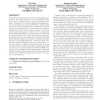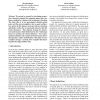101 search results - page 14 / 21 » A Learning Architecture for the Game of Go |
110
click to vote
ATAL
2008
Springer
15 years 3 months ago
2008
Springer
In this paper we address the problem of coordination in multi-agent sequential decision problems with infinite statespaces. We adopt a game theoretic formalism to describe the int...
115
Voted
CORR
2011
Springer
14 years 9 months ago
2011
Springer
Online learning algorithms have impressive convergence properties when it comes to risk minimization and convex games on very large problems. However, they are inherently sequenti...
139
click to vote
MOBIHOC
2012
ACM
13 years 4 months ago
2012
ACM
A key feature of wireless communications is the spatial reuse. However, the spatial aspect is not yet well understood for the purpose of designing efficient spectrum sharing mecha...
106
Voted
CIG
2005
IEEE
15 years 7 months ago
2005
IEEE
Abstract- We present a concept for developing cooperative characters (agents) for computer games that combines coaching by a human with evolutionary learning. The basic idea is to ...
115
Voted
CG
2008
Springer
15 years 3 months ago
2008
Springer
Monte-Carlo tree search is a powerful paradigm for the game of Go. We present a parallel Master-Slave algorithm for Monte-Carlo tree search. We experimented the algorithm on a netw...


